I have been tasked with rewriting a slow query. I solved my performance problem, however I'm restless because I don't understand why one of the approaches I tried is faster than the other.
Query 1 (takes ~13 seconds on the website, ~0.2 seconds in PHPMYADMIN) :
SELECT t.USER_ID, COUNT(DISTINCT r1.id1) as count_matches
FROM b_squad_member_result as t
INNER JOIN (SELECT m.IBLOCK_ELEMENT_ID as id1, (m.IBLOCK_ELEMENT_ID + 2) as id2, (m.IBLOCK_ELEMENT_ID + 4) as id3
FROM b_iblock_element_prop_s3 as m
WHERE m.PROPERTY_8 IS NULL) as r1
ON t.MATCH_ID IN(id1, id2, id3)
INNER JOIN b_uts_user as u ON u.VALUE_ID = t.USER_ID
AND u.UF_ID_TEAM = 2228
GROUP BY t.USER_ID
Execution plan for Query 1
Query 2 (takes ~0.2 seconds on the website, ~0.2 seconds in PHPMYADMIN) :
SELECT t.USER_ID, COUNT(DISTINCT r1.id1) as count_matches
FROM b_squad_member_result as t
INNER JOIN (SELECT m.IBLOCK_ELEMENT_ID as id1, (m.IBLOCK_ELEMENT_ID + 2) as id2, (m.IBLOCK_ELEMENT_ID + 4) as id3
FROM b_iblock_element_prop_s3 as m
WHERE m.PROPERTY_8 IS NULL) as r1
ON t.MATCH_ID = id1 OR t.MATCH_ID = id2 OR t.MATCH_ID = id3
INNER JOIN b_uts_user as u ON u.VALUE_ID = t.USER_ID
AND u.UF_ID_TEAM = 2228
GROUP BY t.USER_ID
Execution plan for Query 2 :
I first went with Query 1 as in PHPMYADMIN it was meeting my performance expectations. However, on the website itself, the query took much more time. After trying lots of different solutions I just decided to change the IN clause for t.MATCH_ID = id1 OR t.MATCH_ID = id2 OR t.MATCH_ID = id3 and this works as fast as it is supposed to. However I would like to understand why is the second approach faster. I've read that the IN clause is transformed into multiple OR clauses before the actual execution. Can it really affect performance that much?

